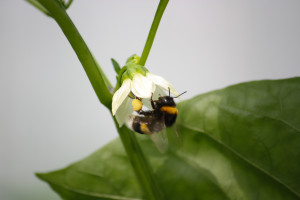One of the biggest challenges facing the Chinese Government is maintaining a safe and secure food supply for its ever-expanding population.In this article Rio Pranning from PA International analyses the challenges and opportunities in a global context, identifying strategic partnerships between the public and private sector, CSR initiatives and natural, biological solutions as three positive ways of addressing this issue.
Through slight adaptations of the Food Value Chain malnutrition can be beaten. Through the application of new biological technologies agricultural production can be both increased and cleaned up: “Food security through food safety,” as one industrial leader suggested during a meeting with the Chinese Academy of Agricultural Sciences.
The World Health Organisation (WHO, 1966) defines food security as existing “when all people at all times have access to sufficient, safe, nutritious food to maintain a healthy and active life”. If around 80 per cent of all food in the Gulf is imported; if other parts of the world are developing similar numbers due to global warming—just look at the melting of the Himalaya—it appears that the world is racing headlong towards a future with scarcities of unseen proportions. As a consequence, any technology, any system, any approach that can improve an uncertain future must be explored and put to use. Fast.
Due to China’s size and its demographic development—ever larger numbers to be fed by dwindling resources—this matter is crucial to China and, indeed, the rest of the world. Increased globalisation means that we are all stakeholders in this issue and thus have a collective responsibility to ensure that China’s rise to 1.7 billion people, and subsequent decrease due to rapid ageing, is assisted appropriately.
One way to address this looming crisis is through public/private sector partnerships (PPP). Governments, international organisations, non-governmental organisations and multinationals are progressively working together in developing strategies and approaches for coordinated action for safe and sufficient food for all. In May 2013 the European Union will launch a new Communication on Nutrition which will be based on a combination of PPP and corporate social responsibility (CSR). CSR is a win-win situation between industries and society whereby industries invest in education and training of civic society in such a way that civic society, local to a factory or extraction industry, is enabled to deliver services or products that the industry requires. Governments can assist such CSR initiatives through taxation or other facilities.
Applied to agriculture, a multitude of manufacturing and extracting companies can actually use their CSR funds, in combination with government funds, to assist current or even new agricultural projects with the introduction, training and use of the latest proven technologies. This is entirely in line with China’s 12th Five-Year Plan (12th FYP) that strongly emphasises investment in research and development to radically improve agricultural output, reduce environmental damage caused by intensive agriculture and embed the entire agricultural sector in an ecological system catering to food safety and food security.
How could this be done? A key example is the current global focus of regulators and industries on the use of biostimulants and biofertilisers. Biostimulants are based on natural products (e.g. seaweed extracts, amino acids, humic acids) and biofertilisers on beneficial soil microorganisms (useful soil bacteria or soil fungi). Both have the demonstrated capacity to improve a plant’s physiology—the functioning of a plant.
For example, they can enhance plant growth, increase the nutrient uptake efficiency, stimulate the plant’s defence system against pests and diseases or enhance a plant’s environmental stress physiology. This results in considerably higher crop yields, sharply reduced need for chemical fertilisers and pesticides and more resilience to unfavourable conditions such as droughts, high temperatures and soil salinity.
Certain biofertilisers, also called inoculants, can fix nitrogen from the air into the soil, which allows for the reduction in the use of chemical nitrogen fertilisers. In short, biostimulants and biofertilisers contribute to better soil and ecological conditions and increase agricultural output with much less environmental damage.
What is the European Union up to in this field? It is requiring a fast reduction of the use of agricultural chemicals to prevent a further dramatic reduction of Europe’s bee population, which are essential to natural pollination.
A similar emphasis on biological solutions is developing in the Americas and, indeed, throughout the Middle East, Asia and Africa. Ever since the 2008 spike in food prices, and its devastating effect on poverty-stricken communities, responsible governments have engaged in both crisis-management efforts and improved production through high technology.
What is the current situation in China? In general terms the Chinese nation is threatened by food and water scarcity, ever longer periods of drought, seriously polluted soil and groundwater due to overuse of chemical fertilisers and pesticides, reduced arable land and reduced numbers of farmers. On Chinese farmland, soil fertility contributes only 50 per cent of agricultural production, which is 20 per cent lower than in western countries. According to a new, unpublished science-based Chinese report, China’s arable land accounts for approximately eight per cent of the world total, yet it uses one third of the world’s nitrogen fertiliser, which suggests serious overuse.
Moreover, 70 per cent of these chemicals are estimated to end up as residual waste, leading to serious soil and water contamination problems, according the findings of the Chinese Academy of Agricultural Sciences (CAAS). In a policy directive issued in late January 2013, the State Council ordered local governments to “attach great importance” to soil pollution and prevent the situation from getting worse, as well as to monitor the soil quality. Local governments should categorise land under their jurisdiction according to soil quality and establish a database by the end of next year.
It is estimated that more than 10 per cent of the Chinese Mainland’s farmland was polluted and that about 12 million tonnes of grain was contaminated by heavy metals every year over the past decades. Other reports claim even more serious environmental damage, including pollution of China’s main rivers. This is also mentioned in the unpublished report. It shows that not only is China the largest user of pesticides worldwide (although the application of chemical pesticides can offset 15 to 30 per cent of annual losses in agricultural output), they also leave contaminating residues on agricultural products, which eventually has a much larger adverse effect on food safety and food security. All of this could be avoided if biostimulants and biofertilisers were used.
According to its 12th FYP the Chinese Government is aware of the urgent need to shift to more sustainable agriculture models. A series of policies is adopted to support and benefit farmers in rural areas. By increasing financial subsidies, reforming rural taxes and other levies, and liberalising the grain market, the Central Government aims to ensure steady and sustainable crop production.
On 16th June, 2011, at the National Conference on the Professional Prevention and Control of Crop Diseases and Pests, the Ministry of Agriculture proposed that pesticide use must be reduced by 20 per cent by the end of the 12th FYP. In the meantime, it proposed to raise the status of agriculture and to change its production and operating practices. So indeed it can be expected that there will be greater emphasis on bio-system prevention and control in agricultural production in the near future.
In this context CAAS and PA plan to organise a ministerial-level symposium in May, 2013, to enhance cooperation in technology areas where it is most needed in order to ensure food security, food safety and public health. The symposium will address the agricultural priorities and objectives in China’s current FYP and national activities and initiatives in improving food safety and food security, as well as seeking opportunities for enterprises to participate in PPP and CSR projects to cope with the challenges of food safety and food security.
Among the speakers at this symposium are experts from Koppert Biological Systems from The Netherlands. Koppert is the international market leader in biological crop protection and natural pollination; they deliver biofertilisers and biopesticides, different natural enemies to control pests, as well as several species of bees to carry out natural pollination. This fits well with the requirements of the 12th FYP. According to Koppert biological control is safe, does not pollute, saves energy, is effective and can be easily incorporated with other plant-protection measures.
CAAS is right to discuss, and then test, the new biological alternatives to fight pests and fertilise soil. This may lead to three wins: one for the government whereby they can clean up soil and groundwater, improve food safety and food security and reduce financial losses caused by food-borne diseases; another is for the consumer who is supplied with safe and healthy food; the last is for industries that can strengthen their ‘license to operate’ while feeding their staff with optimal, locally-produced food. Those interested in the results of the CAAS/PA Symposium should contact info@pa-asia.com.
Rio D. Praaning Prawira Adiningrat is founder and Managing Partner of PA Europe, PA Asia, PA Russia, PA Middle East and PA CSR. In 2004 he established the Public Advice International Foundation (PA International) through which elder statesmen and former top business executives provide advice on international socioeconomic and cultural issues, on a non-profit basis. Projects are focussing on global malnutrition, humanitarian aid, health, education, and environment. PA organise major all-stakeholder conferences with presidents, ministers, IGOs, NGOs, CEOs and civic society.




Recent Comments